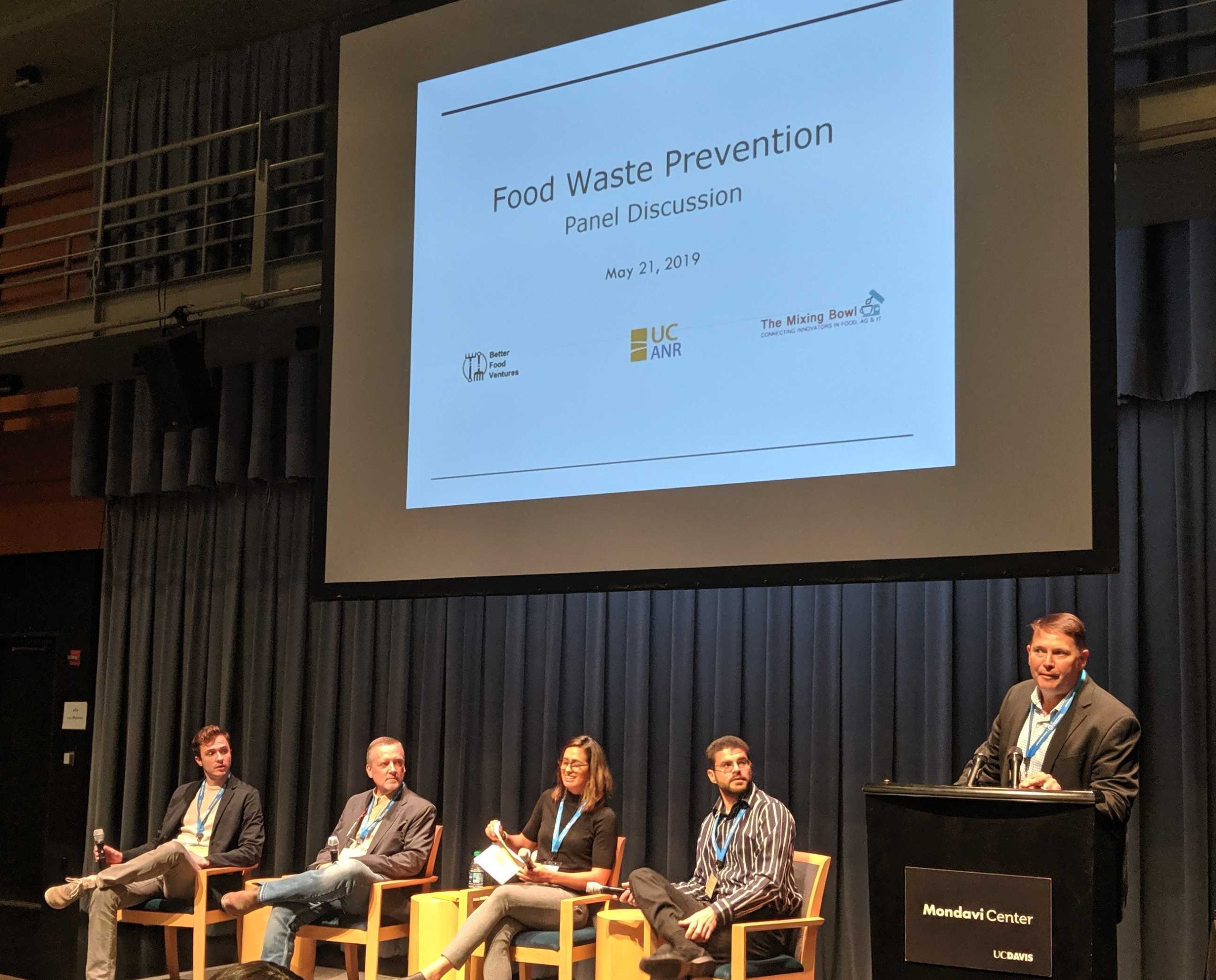The Innovation Institute for Food and Health at UC Davis develops and deploys breakthrough solutions to global issues across the food system through industry-academic collaborations and experiential learning programs.
The Institute’s 2019 Innovator Summit on May 21st featured lively and informative food waste and indoor ag panels, organized by the UC Division of Agriculture and Natural Resources, The Mixing Bowl, and The VINE,
We’ll cover the food waste panel discussion here. In a few days, we’ll cover the indoor ag panel discussion.
The food waste panel was moderated by Mixing Bowl founder Rob Trice, whose questions covered the topics in bold below.
Panelists’ bio and role in reducing food waste
Emily Gousen is Capital and Innovation Manager at ReFED (‘Rethinking Food Waste through Economics and Data’). ReFED is a non-profit think tank taking a data-driven approach to reduce the 53 tons of food wasted each year in the US. ReFED’s theory of change is to influence the waste management behaviors and practices of the 50 food business that sit between producers and consumers.
Irwin R Donis-Gonzalez is a Cooperative Extension Specialist in the Department of Biological and Agricultural Engineering at UC Davis. With USAID funding, he developed a “dry card” technology that assesses moisture levels in food. The dry-card is used extensively in developing countries, where the biggest food waste issues are at the production, harvest and processing stages.
Adam Behrens is Co-Founder and CEO of Cambridge Crops, a firm commercializing natural solutions that extend the shelf life a wide variety of foods. The coating technology is silk-based, tasteless and invisible.
The firm’s initial focus is on higher-value retail products, like cut produce and high value protein, like beef and fish.
Eric Tilton is CTO, HermetiaPro Inc., a firm commercializing the composting of almond hulls using black soldier fly larvae, which in turn become a high-value animal feed. The California almond industry alone produces 5 billion pounds of hulls per year. Black soldier fly has been approved for poultry feed in California and is particularly important to the organic poultry industry to supply an essential amino acid. The hull compost is equal in value to worm castings, and the only waste is the reproductive fly bodies, which are a rich source of chitin, a compound with industrial uses.
What’s working in food waste prevention and reduction? Is a ‘carrot’ approach as seen in Denmark, or a ‘stick’ approach as seen in South Korea required to change behavior?
Emily noted that over a dozen large food companies have pledged to reduce their food waste by 50 percent by 2030. ReFED recently published an investment report showing that $134 million in philanthropic donations were made in 2018 to organizations in food recovery. In 2018, $125 million in private capital went to food waste startups. There is increasing awareness of the importance of putting money to work.
Emily emphasized educating children about the value of food, and deploying technology to make it easy to reduce food waste. She noted the need for incentives to better value the producer, and that fact that consumers often underestimate the negative impact of their behavior. She felt that punitive regulations, like those in South Korea, would only be necessary if no progress occurred otherwise.
Irwin said technology that is accessible, inexpensive and easy to use is critical. His dry-card is an easy to use, inexpensive technology that costs only 25 cents to produce in Latin America. Consumer education in developing countries is sometimes not as important because people recognize the value of food and take great care not to waste.
Adam explained that new technology will have greatest impact if it can fit economically and seamlessly into the supply chain, that is, without major changes and cost in food processing and distribution.
The impact of climate change on food waste reduction.
Eric noted that the ghg emissions of insect rearing are much lower than those of larger animals, and therefore it is necessary to consider increasing human consumption of insect protein. HermetiaPro is looking to enter the aquaculture market, particularly in the EU, where the regulatory path is easier due to a greater awareness of the need for long-term, sustainable, alternative fish feed.
Just in the last year $90-100 million has been invested in insect technology firms in Canada and the EU. Large investments are needed to achieve the economies of scale and automation required to really hit competitive price points.
The “ugly” produce debate: is there competition between food banks and new firms marketing ‘ugly’ produce online?
Emily doesn’t think so. ReFED determined there is over 10 million tons of food left in fields each year, so there is no supply shortage. Imperfect Produce, for example, addresses the economic obstacles to harvesting imperfect produce and provides incentives for harvesting grade B crops.
What’s the ‘low-hanging fruit’ to solve food waste?
Irwin emphasized the value of data mining and data sharing. The Smart Farm initiative at UC Davis, headed by Professor David Slaughter, has a mission to maximize the value of farm-level data.
Emily emphasized precompetitive solutions among business. For example, the NextGen Cup Challenge, where McDonalds and Starbucks came together to sponsor a competition to reduce plastic cup waste.
Adam noted that although reducing plastic waste is important, less plastic can actually lead to more food waste if alternatives are not adequate. Cambridge Crops can play a role here.
We were excited to learn about the many ways that innovators are tackling food waste sustainably from alternative packaging to drying technology. If you know of food waste innovators that we should be talking to or covering, let us know at hello@vine.press4.pagedesign.us or fill out this quick form. Stay tuned for our next write up from the Indoor Agriculture panel at the Innovation Institute for Food and Health 2019 Innovator Summit.
About the author: Leanna Sweha is an attorney with an agtech background and is Program Director for AgStart. She is passionate about promoting new sustainable agriculture and food companies.

